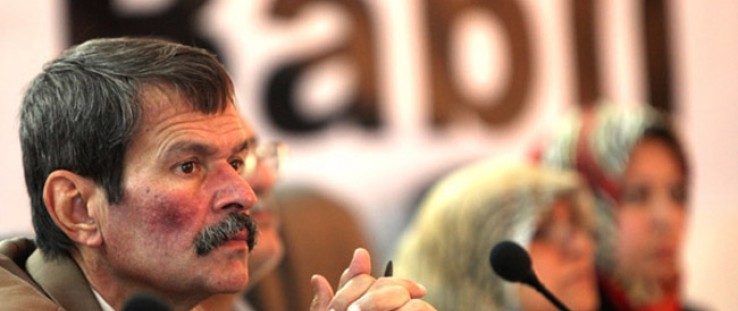 An Iraqi Tatweer adviser works to strengthen linkages between the governorate councils of Babil and Anbar.
USAID
An Iraqi Tatweer adviser works to strengthen linkages between the governorate councils of Babil and Anbar.
USAID
 An Iraqi Tatweer adviser works to strengthen linkages between the governorate councils of Babil and Anbar.
USAID
An Iraqi Tatweer adviser works to strengthen linkages between the governorate councils of Babil and Anbar.
USAID
Thirty years ago, the Iraqi civil service was a model of efficiency. But decades of conflict, dictatorship, and isolation left the country’s ministries incapable of addressing the needs of its population.
Since 2006, USAID’s National Capacity Development Program, or Tatweer,which means “development” in Arabic, has significantly improved the ability of Iraqi ministries to fulfill their responsibilities to deliver services to citizens. The program worked with Iraqi key service ministries and central executive offices to improve public services by modernizing the core ministries’ systems and processes and developing the capacity of their civil servants.
This comprehensive effort had a nationwide scope, reaching all 18 Iraqi provinces. Through the program, USAID has trained 105,000 civil servants in planning, management, finance, human resources, and other key public administration disciplines. Embedded Arabic-speaking experts also assisted them in applying their skills on the job—installing modern systems and overhauling outdated processes.
“The program teaches skills that enable full Iraqi ownership,” said Ali Baban, the Iraqi minister of planning and development cooperation. “Iraqis must take the torch from USAID/Tatweer in this transitional year and continue on the path that we have taken together.”
A Worldwide Model?
Baban says the program is an unqualified success. “It should be seen as a model not only for bilateral U.S.-Iraqi programs but for cooperative assistance projects worldwide,” he said.
The program’s most noteworthy accomplishment is its close involvement with the Ministry of Planning in finalizing Iraq’s National Development Plan (NDP), which calls for comprehensive social, economic, and environmental development in Iraq with the very concrete goals of generating 9.8 percent annual GDP growth, creating 3.5 million new jobs, and reducing poverty by 30 percent below the 2007 level within the next five years.
Last July, Iraqi Prime Minister Nouri al-Maliki unveiled the plan to the media and the public. “Never in Iraq’s recent history has everyone’s point of view been so represented and accounted for within one plan,” Baban said.
Inadequate funding, crippling sanctions, debilitating investment policies, and lack of stakeholder input had led to under-performance across all of Iraq’s ministries and sectors.
To address these issues, USAID assisted the ministries in everything from comprehensive civil service reform to leadership development at the lowest level of service delivery.
The civil service system, in particular, had suffered from decades of neglect. The Iraqi Government asked USAID to help it undertake comprehensive civil service reform by incorporating principles of professionalism, transparency, and non-partisanship.
“[USAID] is playing a historic role rebuilding the foundation of Iraq’s new state at federal and provincial levels,” said Farouk Abdallah Abdel Rahman, the prime ministerial adviser for provincial affairs. “History will long remember their work.”
Managing Oil Wealth
Iraq is home to the Middle East’s second-largest oil reserves, a factor which will undoubtedly play a major role in the future prosperity of the country. Setting up internationally accepted standards and promoting best practices will allow the country to tap into its oil resources in an informed manner.
To overcome these challenges, the Government of Iraq needed the assistance of international oil companies, but did not have the contracting, management, oversight, or procurement mechanisms in place to secure the companies’ support.
The Ministry of Oil approached USAID’s Tatweer team for assistance. Instead of simply helping the ministry draft procurement documents, the team addressed the institutional roadblocks that burdened the procurement process.
By training ministry staff in procurement, developing a standardized procurement manual, and improving management and oversight functions, USAID brought the ministry’s processes up to international standards. As a result, the ministry was able to hold Iraq’s first open and transparent solicitation and award several oil contracts. Since the initial tender, which attracted a successful bid from the companies BP and CNPC, the ministry has held three additional auctions of oil and gas fields, which have resulted in the largest increase of oil production capability in world history.
USAID’s training and development of Ministry of Oil employees in the procurement process has been a key factor for the ministry’s success, said its director general, Nazar H. Al Hafidh.
“Through USAID/Tatweer, the American people are building the basis for stable Iraqi ministries from the inside out,” noted Alex Deprez, deputy mission director at USAID/Iraq.
USAID and the Iraqi Government are committed to continued reform, specifically in the areas of service delivery in the health and education sectors.
“The Iraqis and expatriates working on Tatweer have…returned to Iraq the ability to teach world-class public administration skills and build modernized administrative systems,” said Baban. “The end result of [these] efforts is cleaner water for our children, better health care for our grandparents, and energy for our homes and factories.”









Comment
Make a general inquiry or suggest an improvement.